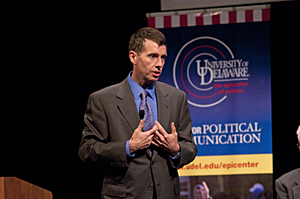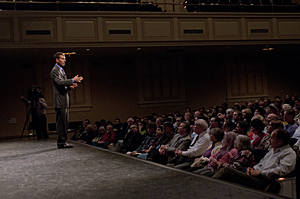ADVERTISEMENT
- Rozovsky wins prestigious NSF Early Career Award
- UD students meet alumni, experience 'closing bell' at NYSE
- Newark Police seek assistance in identifying suspects in robbery
- Rivlin says bipartisan budget action, stronger budget rules key to reversing debt
- Stink bugs shouldn't pose problem until late summer
- Gao to honor Placido Domingo in Washington performance
- Adopt-A-Highway project keeps Lewes road clean
- WVUD's Radiothon fundraiser runs April 1-10
- W.D. Snodgrass Symposium to honor Pulitzer winner
- New guide helps cancer patients manage symptoms
- UD in the News, March 25, 2011
- For the Record, March 25, 2011
- Public opinion expert discusses world views of U.S. in Global Agenda series
- Congressional delegation, dean laud Center for Community Research and Service program
- Center for Political Communication sets symposium on politics, entertainment
- Students work to raise funds, awareness of domestic violence
- Equestrian team wins regional championship in Western riding
- Markell, Harker stress importance of agriculture to Delaware's economy
- Carol A. Ammon MBA Case Competition winners announced
- Prof presents blood-clotting studies at Gordon Research Conference
- Sexual Assault Awareness Month events, programs announced
- Stay connected with Sea Grant, CEOE e-newsletter
- A message to UD regarding the tragedy in Japan
- More News >>
- March 31-May 14: REP stages Neil Simon's 'The Good Doctor'
- April 2: Newark plans annual 'wine and dine'
- April 5: Expert perspective on U.S. health care
- April 5: Comedian Ace Guillen to visit Scrounge
- April 6, May 4: School of Nursing sponsors research lecture series
- April 6-May 4: Confucius Institute presents Chinese Film Series on Wednesdays
- April 6: IPCC's Pachauri to discuss sustainable development in DENIN Dialogue Series
- April 7: 'WVUDstock' radiothon concert announced
- April 8: English Language Institute presents 'Arts in Translation'
- April 9: Green and Healthy Living Expo planned at The Bob
- April 9: Center for Political Communication to host Onion editor
- April 10: Alumni Easter Egg-stravaganza planned
- April 11: CDS session to focus on visual assistive technologies
- April 12: T.J. Stiles to speak at UDLA annual dinner
- April 15, 16: Annual UD push lawnmower tune-up scheduled
- April 15, 16: Master Players series presents iMusic 4, China Magpie
- April 15, 16: Delaware Symphony, UD chorus to perform Mahler work
- April 18: Former NFL Coach Bill Cowher featured in UD Speaks
- April 21-24: Sesame Street Live brings Elmo and friends to The Bob
- April 30: Save the date for Ag Day 2011 at UD
- April 30: Symposium to consider 'Frontiers at the Chemistry-Biology Interface'
- April 30-May 1: Relay for Life set at Delaware Field House
- May 4: Delaware Membrane Protein Symposium announced
- May 5: Northwestern University's Leon Keer to deliver Kerr lecture
- May 7: Women's volleyball team to host second annual Spring Fling
- Through May 3: SPPA announces speakers for 10th annual lecture series
- Through May 4: Global Agenda sees U.S. through others' eyes; World Bank president to speak
- Through May 4: 'Research on Race, Ethnicity, Culture' topic of series
- Through May 9: Black American Studies announces lecture series
- Through May 11: 'Challenges in Jewish Culture' lecture series announced
- Through May 11: Area Studies research featured in speaker series
- Through June 5: 'Andy Warhol: Behind the Camera' on view in Old College Gallery
- Through July 15: 'Bodyscapes' on view at Mechanical Hall Gallery
- More What's Happening >>
- UD calendar >>
- Middle States evaluation team on campus April 5
- Phipps named HR Liaison of the Quarter
- Senior wins iPad for participating in assessment study
- April 19: Procurement Services schedules information sessions
- UD Bookstore announces spring break hours
- HealthyU Wellness Program encourages employees to 'Step into Spring'
- April 8-29: Faculty roundtable series considers student engagement
- GRE is changing; learn more at April 15 info session
- April 30: UD Evening with Blue Rocks set for employees
- Morris Library to be open 24/7 during final exams
- More Campus FYI >>
1:49 p.m., Nov. 11, 2010----David Plouffe, a University of Delaware alumnus and political adviser to President Barack Obama, delivered a lecture titled “After the Election: What Now for Obama?” on Wednesday night, Nov. 10, in Mitchell Hall as part of UD's National Agenda 2010 speaker series.
Plouffe, who is also a fellow of UD's Center for Political Communication, which sponsors the National Agenda series, focused his talk on subjects ranging from Americans' longing for leadership in every aspect of life, not just in politics, to how it is impossible to predict the results of the next election based on the results of the last one.
Of the need for leadership, Plouffe said that recently, there has been a “cry for our leaders in Washington: 'Will you just get along? Will you try to solve the problems? Will you stop yelling at each other? Will you start acting like adults?' And by the way, that's not just a message only aimed at Washington or only aimed at politicians, it's aimed at business leaders and academic leaders and the media. People are wanting to have more leadership.”
Plouffe discussed how most Americans look at politicians and see people worried about extending their own terms in office rather than looking at ways to solve the country's problems, citing the fact that people rarely focus on Obama's actual policies but rather how those policies will affect his time in office.
“Some of the things that the president did over the last two years, when you turn on the TV or the Internet, the substance of them is rarely ever discussed. It's always 'What's the latest poll number? What does it mean politically?' You can see it in the aftermath of the election, 'Should we have done X, Y and Z?' Not was it the right thing to do or was it good for the country in the long term, but simply was it helpful in the election?”
Plouffe said that he thinks that an unstated message that came out of the recent election results was the American people saying, “We want you to start caring a lot more about our jobs than yours.”
Talking about how it's impossible to gauge how the next election will pan out based on the results of the most recent election, Plouffe noted that “in politics, two years is like 200 years.”
Plouffe pointed out that Obama and Republican opponent John McCain were roughly tied among voters who cast ballots in the 2004 presidential election between George W. Bush and John Kerry. But, he said, it was the large number of new voters who propelled Obama to victory in 2008. That was something that would have been hard to predict based on the 2004 election.
“There's a lot of attention paid to the 2010 electorate, and the 2012 electorate is going to be fundamentally different than the 2010 electorate in many, many ways,” Plouffe said. “It will be much larger -- 55-60 million more people will vote in 2012 than voted in 2010. It will be younger -- 18 percent of the electorate in 2008 was under 30, and 11 percent was under 30 last week. It will be more diverse -- there will be many more Latino voters and African American voters in the electorate, and the independents who vote will be more moderate as a group than they were last Tuesday, when they skewed very conservative.”
Plouffe said that the most important dynamic in the 2012 election will be whether or not people believe America is headed in the right direction. He said issues like the economy are less about statistics and more about how people feel.
Plouffe ended his talk by saying that “we can really have that wonderful future that all of our young people so desperately deserve and need, but it's going to take a lot of work, and it's going to take more than just caring about the next poll, the next month, the next pundit, the next election.”
National Agenda 2010 is sponsored by the University's Center for Political Communication and moderated by Ralph Begleiter, center director.
The final National Agenda 2010 lecture will feature Amos Guiora, a professor of law at the University of Utah, who will discuss “Freedom from Religion: Managing Domestic Terrorism.” The presentation will be held at 7:30 p.m., Wednesday, Nov. 17, in Mitchell Hall.
Article by Adam Thomas
Photos by Duane Perry




